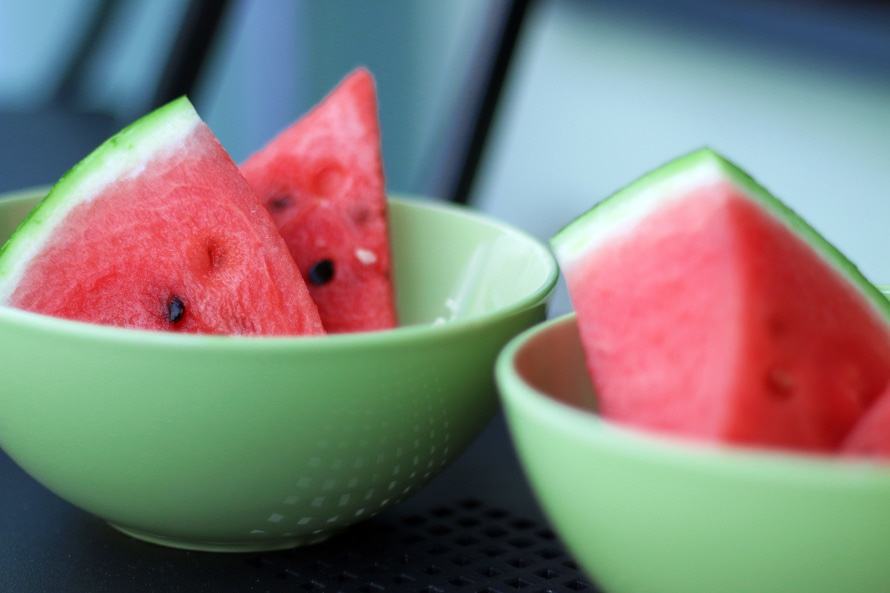Bon Appetit - Just Plain Good Food
Watermelon & Summer a perfect fit
by Tammera J. Karr, PhD, BCHN, BCIH

Summer and watermelon are inseparable for me, as a kid riding in the truck with my dad, we would drive by fields in North Eastern Oregon with ripe watermelons. I do not think we ever went to a picnic, camping or a potluck that didn’t have a watermelon or two to eat with juice dripping abandon in the summer. Creeks or streams in camping areas would be littered with watermelons cooling, waiting to be sliced open and enjoyed. Watermelons have become synonymous with summer for a good reason, their refreshing quality, and sweet taste combats the heat while providing nutrients and minerals.
Watermelons are found almost everywhere in the world. Despite popular belief watermelon is only water and sugar, it is considered a nutrient-dense food, that provides vitamins, minerals and antioxidants.
Along with cantaloupe and honeydew, watermelons are a member of the botanical family Cucurbitaceae. There are five common types of watermelon: seeded, seedless, mini, yellow and orange.
- One cup of diced watermelon (152 grams) contains 43 calories, 0 grams of fat, 2 grams of sodium, 11 grams of carbohydrate (including 9 grams of sugar) and 1 gram of fiber.
- One cup of watermelon will provide 17% of vitamin A, 21% of vitamin C, 2% of iron and 1% of calcium RDA.
Other nutrients found in watermelon include thiamin, riboflavin, niacin, vitamin B-6, folate, pantothenic acid, magnesium, phosphorus, potassium, zinc, copper, manganese, selenium, choline, lycopene, and betaine. - Despite being an excellent source of the above nutrients, watermelon is made up of 92% water.
Possible health benefits of watermelon
Blood pressure: A study published in the American Journal of Hypertension found that watermelon extract supplementation reduced ankle blood pressure, brachial blood pressure and carotid wave reflection in obese middle-aged adults with prehypertension or stage 1 hypertension and that watermelon extract improved arterial function. Diets rich in lycopene may help protect against heart disease.
Cancer: As an excellent source of the potent antioxidant vitamin C as well as other antioxidants, watermelon can help combat the formation of free radicals known to cause cancer. Lycopene intake has been linked with a decreased risk of prostate cancer prevention in several studies.
Digestion and Regularity: Watermelon contains water and fiber helping to prevent constipation and promote regularity of the healthy digestive tract.
Hydration: Made up of 92% water and full of essential electrolytes, watermelon, is a great snack to have on hand during the hot summer months to prevent dehydration.
Inflammation: Choline is an important nutrient in watermelon that aids our bodies in sleep, muscle movement, learning and memory. Choline helps to maintain the structure of cellular membranes, aids in the transmission of nerve impulses, assists in the absorption of fat and reduces chronic inflammation.
Muscle soreness: Watermelon has been shown to reduce muscle soreness and improve recovery time following exercise in athletes. Researchers believe this is due to the amino acid L-citrulline contained in watermelon.
Skin: Because watermelon contains vitamin A, required for sebum production that keeps hair moisturized, and is necessary for the growth of all body tissues. Adequate intake of vitamin C is needed for building and maintenance of collagen, which provides structure to skin and hair. Watermelon contributes to hydration, which is vital for healthy looking skin and hair.
Watermelon is a fruit that is rich in electrolytes sodium and potassium that we lose through our perspiration. Watermelon has a unique cooling effect and is high in citrulline, an amino acid that bodies use to make arginine, amino acid, which is utilized in the urea cycle to remove ammonia from the body.
Eating Organic watermelon is a safe alternative to energy drinks, it contains high water quantity, that hydrate without caffeine that dehydrates us.
Caution: If you are a diabetic be sure to monitor your blood sugar for safety. Watermelon contains enough sugar to be problematic.
To a safe summer and good health
Visit the National Watermelon Board’s recipe site for even more fun, inventive ideas on how to incorporate more watermelon into your diet.
Sources
http://healthmad.com/nutrition/10-health-benefits-of-watermelon/#ixzz3fEoeQkMB
http://www.medicalnewstoday.com/articles/266886.php
http://www.whfoods.com/genpage.php?tname=foodspice&dbid=31


